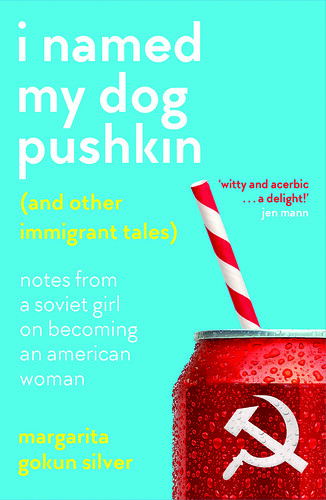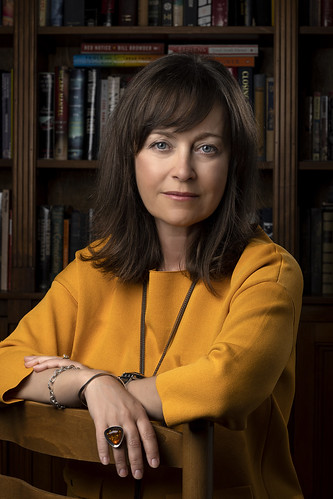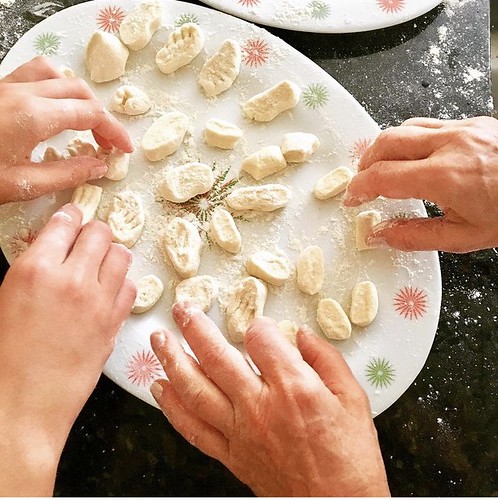I love this book—and I think you will, as well. The new intercultural memoir from Margarita Gokun Silver, entitled I Named My Dog Pushkin (and Other Immigrant Tales), is both an extremely humorous memoir about living an international life, and an unflinching glimpse into (as expected, with a global life) the never-ending process of cultural adjustment.

Margarita Gokun Silver is a freelance journalist, essayist, and novelist. Her articles and essays have been published in The New York Times, The Washington Post, The Guardian, BBC, NPR, and The Atlantic, among others.
With SUCH wry humor (I couldn’t stop laughing, throughout!), Gokun Silver tackles her culture of origin, the culture of her home of choice, and other cultures in which she has lived. All of these stories combine to provide one rollicking book with your new best friend, in which she shares tales about living all around the world, family dynamics, language, relationships, and how laughter truly is universal. While reading, every time I laughed, my husband would ask, “Margarita at it again?”; I consistently replied in the affirmative. I’d read bits out loud to him, and then we would discover another chapter or two had gone by quickly. A memoir like this is so very rare, one in which you learn a great deal, while laughing throughout.
Highly, highly recommended.
We were lucky enough to catch up with Gokun Silver, and ask her about the book, sense of home, humor, moving abroad, and more. Here’s what she had to say…

Please tell us a little bit about your new book, I named my dog Pushkin...
Fake an exit visa, fool the Soviet authorities, pack enough sausage to last through immigration, buy a one-way Aeroflot ticket, and the rest will sort itself out. That was the gist of every Soviet-Jewish immigrant’s plan in the 1980s, mine included. Despite my father's protestations that we'd get caught and thrown into a gulag, I convinced my family to follow that plan.
When we arrived in the US, I had a clearly defined objective–become fully American as soon as possible, and leave my Soviet past behind. But I soon learned that finding my new voice was harder than escaping the Soviet secret police.
I found myself changing my name to fit in, disappointing my parents who expected me to become a doctor, a lawyer, an investment banker, and a classical pianist – all at the same time, learning to date without hang-ups (there is no sex in the Soviet Union), parenting my own daughter ‘while too Russian’, and not being able to let go of old habits (never, ever throw anything away because you might use it again). Most importantly, I found that no matter how hard you try not to become your parents, you end up just like them anyway.
What led you to pen this memoir?
I've been thinking of this memoir for many years now because every time I told stories I recount in my essay collection, people would say to me, “Oh, you should write about it—it’s fascinating.” And so little by little I started thinking about writing all of it down, recounting what it was like to grow up and come of age as a young Jewish woman in the Soviet Union, what it was like to convince my family to emigrate, and, finally, what it was like to build a life as an immigrant to the U.S.
I couldn't stop laughing, throughout the book. How did you narrow down your life stories to focus on the ones you shared?
My editor and I worked very closely on which stories would be of most interest to readers. We went with sort of dividing them into three time periods: the Soviet Union, the immigration journey, and the assimilation upon arrival. But they aren’t only chronological—they touch upon things like being a daughter of immigrants and the expectations this comes with; going to a US university while recently Soviet; parenting as an immigrant, being in a relationship with someone from another culture, etc.
You've had experience as an expat in several places. Do you feel that the more you live abroad, the more your sense of home goes with you, instead of being a place?
In terms of a sense of home, it’s recently become a sore point with me because since leaving the Soviet Union I haven’t really succeeded in building a constant home. Because for work (first mine and then my husband’s) I have moved around quite a bit—mostly abroad—my sense of home have become invested in people with whom you move and, especially, my daughter. When she left the nest to go to university I was like “okay and now what?” and I felt really lost, unmoored even (I wrote an essay about that). So now I’m starting to look for home—for belonging, really—and documenting this process in a newsletter called HOME, IDENTITY, AND BELONGING (A NEVER-ENDING SEARCH)— sign up to join me in my search!
You often use humor to diffuse cultural differences. What does that look like in real life for you?
Laughing at myself a lot—definitely helps to cut down on stress and not take things too personally!
Can anything prepare a person for moving abroad?
You've got to be open-minded. Things are going to be and look different from what you’re used to. The food’s going to be different. The language’s going to be different. People are going to be different. Be open-minded in how you approach situations, in how you approach your new life, and in how you relate to people—in how you view them. Leave your judgments at home, be curious, willing to learn, willing to understand, and willing to make connections. Plus, of course, read before you go—that's probably a common advice. Learn the language if you can—even if just the basics. And definitely be open to new experiences because that's what you're going to have.

Grandma and granddaughter making lenivie vareniki
How can readers find your book, and work?
http://www.margaritagokunsilver.com/books.html
Book in the US https://www.amazon.com/dp/B091FPY38M
Book in the UK/EU https://www.hachette.co.uk/titles/margarita-gokun-silver/i-named-my-dog-pushkin-and-other-immigrant-tales/9781909770669/#
What's up next for you?
I'm working on a novel and I have an idea for a nonfiction book that's at the very early stages. And also, I am in my second year of the creative writing program at the University of Oxford and for my second year project, I will be working on another novel. So a couple of novels, a nonfiction project…enough to keep me busy.
Find her socials at:
http://facebook.com/MargaritaGokunSilver
http://twitter.com/MGokunSilver
http://instagram.com/MargaritaGokunSilver
https://www.linkedin.com/in/margaritagokunsilver/
Pin for later:

